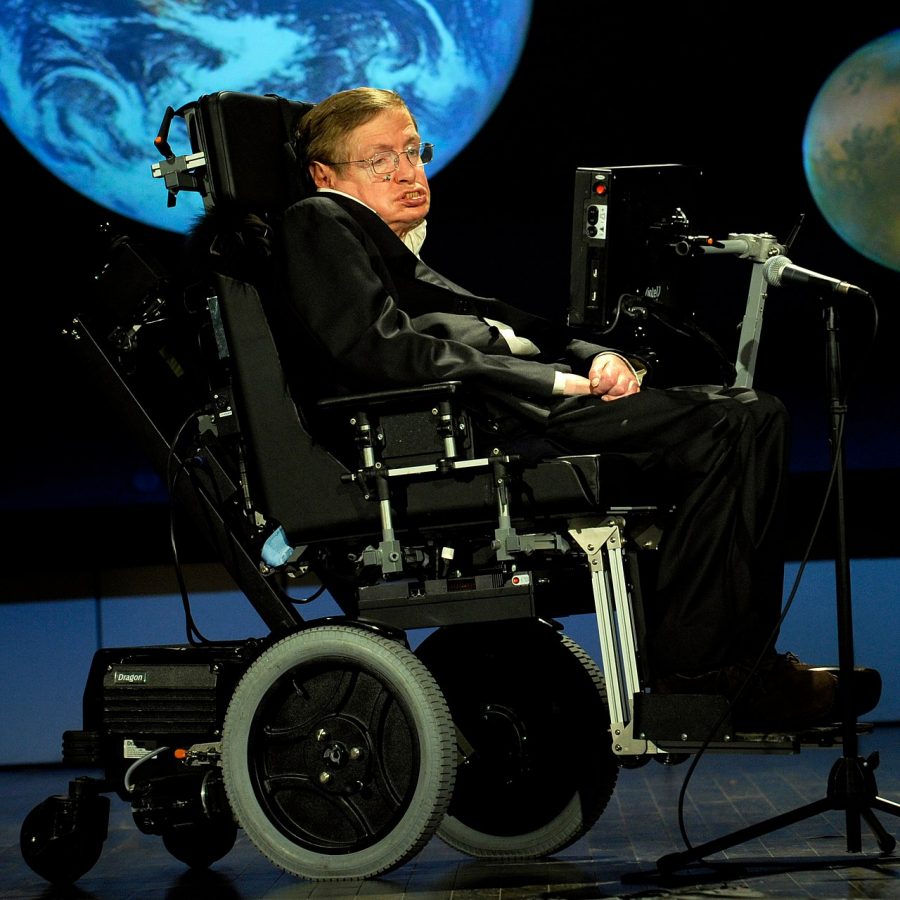Remembering Stephen Hawking
April 14, 2018
On March 14, 2018, renowned physicist and scientific visionary Professor Stephen Hawking passed away at 76 years old. Having been diagnosed with amyotrophic lateral sclerosis (ALS) at 22 years old, Hawking was given just a few years to live, but exceeding all expectations, he and his influence continued. In the fifty years that Stephen Hawking defied the laws of nature that predicted his death, he worked painstakingly to investigate and advance the laws that define our universe.
Stephen Hawking was born on January 8th, 1942, in Oxford, England, to Frank and Isobel Hawking. His parents were interested in science, both working in medical research. During his early schooling, Stephen was not originally successful, despite being dubbed “Einstein” by his peers. Predictably, his earliest interests and most notable successes in school were in the subjects of science and mathematics.
Despite his father’s wishes for Stephen to pursue a career in medicine, he went on to pursue mathematics and physics at Oxford University. He obtained a bachelor’s degree in math and physics before transferring to Cambridge University for his master’s and Ph.D. education.
Hawking went on to occupy a variety of careers including astrophysicist, mathematician, cosmologist, theoretical physicist, author, and Director of Research at the Centre for Theoretical Cosmology at Cambridge.
Stephen Hawking was a prolific author during his lifetime, publishing nearly 20 books in addition to countless scientific papers, lecture notes, and essays. These include such titles as “My Brief History,” an autobiography; “The Grand Design,” which explains the creation and beginning of the universe; “A Brief History of Time,” which reviews many theories, such as those of Newton and Einstein, the Big Bang, black holes, spiral galaxies, and strong theory; and along with his daughter, he co-authored a series of children’s books chronicling the adventures of a young boy named George as he explores various phenomena of the universe.
Stephen Hawking received over 15 awards in his lifetime for his work in physics and cosmology. Some of the more notable ones being the Presidential Medal of Freedom in 2009, the highest civilian award in the United States and given “for especially meritorious contribution to (1) the security or national interests of the United States, or (2) world peace, or (3) cultural or other significant public or private endeavors”; the Copley Medal in 2006, a scientific award that is given by the Royal Society for outstanding achievements in science; the Gold Medal of the Royal Astronomical Society in 1985, the highest award given by the Royal Astronomical Society; the Albert Einstein Medal twice, first in 1978, then in 1979; the Adams Prize in 1966, one of the most admirable and prestigious prizes awarded by the University of Cambridge for contributions to mathematics; and the Special Breakthrough in Fundamental Physics Prize in 1987, among others.
No matter the myriad professions, books, and medals to his credit, Stephen Hawking is renowned as the most talented and influential physicists of our time due to his monumental contributions to our current understanding of the universe. In the late 1960s, Hawking along with his colleague Roger Penrose studied black holes using Einstein’s general theory of relativity. In 1970, Stephen Hawking developed the first mathematical proof for singularity, providing guidelines of the necessary conditions for the existence of singularities, and contributing to our understanding and acknowledgment of this phenomena.
In 1974, Hawking once again demonstrated his incredible genius, being the first to show that the gravitational fields surrounding black holes affect the production of pairs of particles and antiparticles. Essentially, he was able to conclude that radiation was emitted from black holes due to the relationship between black holes and gravity. This discovery became famously known as “Hawking radiation,” immortalizing the physicist along with his theory.
Stephen Hawking’s influence did not end here. He continued contributing to the fields of science and mathematics, proving the theory of relativity through mathematical proofs and derivations, redefining the Big Bang theory through those same concepts, and proving that the universe has no boundaries, a fact rejected by the scientific community for the majority of history.
Stephen Hawking not only contributed to the understanding of such complicated fields as math and physics, but he completely reshaped the ways in which we perceive our universe. Children growing up after 1970 would learn about black holes in their textbooks, for the first time in world history being able to acknowledge them as a common and fathomable event. Students of physics and mathematics everywhere benefited from the expansion of the theories of Hawking’s predecessors, and scientists will be able to continue to explore the circumstances of this world and beyond thanks to Hawking’s contributions and accomplishments.














